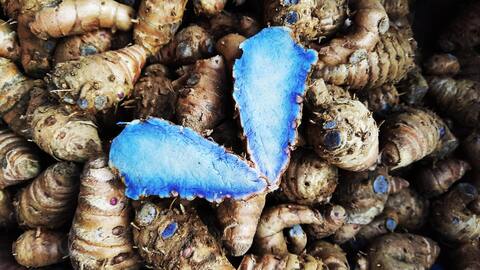Do you know about black turmeric? Exploring its unique characteristics
What's the story
Black turmeric or kala haldi is a lesser-known type of turmeric that has a dark color and several possible health benefits. Since ancient times, this unusual herb has been used in traditional medicine. This perennial herb grows well in clayey, moist deciduous forest regions. Primarily found in North-East and Central India, it can also be seen growing in certain regions of South India.
Black turmeric
How to identify a black turmeric
Black turmeric has flesh in the shade of blue-purple, sometimes lighter in the middle or next to the skin, or it can appear entirely blue or in vivid, dark, concentric circles. The rhizomes have a spicy, harsh, sour, and earthy flavor; they are not usually eaten by themselves like regular turmeric. Besides, black turmeric has a powerful scent that is similar to camphor.
Usage
How it is used
Mostly used in tinctures, teas, and pastes, black turmeric is often added to sugarcane, honey, or other ingredients to form an infusion. Black turmeric can also be used as a nutritional supplement, added sparingly so as not to overpower the dish. The rhizomes can be used either fresh or powdered, and health-conscious people prefer to use them in smoothies and juices.
Benefits
Has anti-inflammatory content
Higher concentrations of curcuminoids, especially a unique form known as ar-curcumin, which has strong anti-inflammatory qualities, are found in black turmeric. This makes it an all-natural pain reliever that may help with ailments like headaches, rheumatism, and muscle aches. Black turmeric's anti-inflammatory qualities help relieve indigestion, bloating, and ulcers. It also increases the production of bile, which facilitates digestion and nutritional absorption.
Antioxidant
Antioxidant boosters
Antioxidants included in black turmeric may aid in the fight against oxidative stress and promote general health. Frequent ingestion may help minimize the risk of chronic diseases and enhance the immune system. Black turmeric curcumin has neuroprotective properties that may enhance memory and cognitive performance. Research indicates that it may be beneficial in averting neurodegenerative illnesses such as Alzheimer's and age-related cognitive loss.
